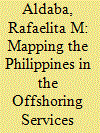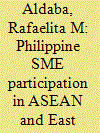|
|
|
Sort Order |
|
|
|
Items / Page
|
|
|
|
|
|
|
| Srl | Item |
| 1 |
ID:
167871


|
|
|
|
|
| Summary/Abstract |
This paper aims to analyse the current position and potential for upgrading of the Philippines in the global value chain of information technology offshoring services. With its rapid growth in the last decade, the Philippines is characterized as strong in voice and is expanding in the non-voice and more complex services sectors. Applying the IT offshoring services framework introduced by the Duke Center on Globalization, Governance and Competitiveness (CGGC) GVC, the analysis shows that the industry's upgrading strategy could pursue the following trajectories: first, upgrading from business process outsourcing (BPO) to knowledge process outsourcing (KPO) especially in medical, financial and legal services; second, expansion and upgrading within information technology outsourcing (ITO); and third, inter-sectoral upgrading to verticals or industry-specific activities, particularly shared services companies, game development, and engineering design in manufacturing. The results of the study indicate that human capital development will be critical in upgrading the Philippines in the information technology and business process management (IT-BPM) global value chain (GVC).
|
|
|
|
|
|
|
|
|
|
|
|
|
|
|
|
| 2 |
ID:
152287


|
|
|
|
|
| Summary/Abstract |
This study aims to examine the extent and nature of Philippine SME participation in ASEAN economic integration. Based on a survey of 205 establishments, the results indicate that out of 205 firms, 41 per cent are FTA users, of which 48 (or 40 per cent) are SMEs while 33 (44 per cent) are large enterprises. The survey shows that although most firms are aware of the AEC (ASEAN Economic Community), they still have limited knowledge about the more specific impact of AEC on their business operations. About 62 per cent of SMEs are unaware of how the AEC would affect their business operations. Regarding the perceived effects of FTAs on SMEs, 53 per cent of the respondents indicated that they do not know, have no opinion or have no response. The major reason cited by firms for not using FTAs is they do not know how to use them. The regression analysis on the determinants of FTA use shows that the coefficients on firm size, age, exporting, foreign ownership, engaging in innovation, membership in industry association, and awareness of the AEC are all positive and significant. In terms of government support and assistance, the survey results indicate that only a small proportion of the respondent firms are being reached by existing government programmes. The results reaffirm the need for more substantial awareness programmes especially on how to use FTAs and how firms can take advantage of the opportunities arising from AEC integration and other FTAs.
|
|
|
|
|
|
|
|
|
|
|
|
|
|
|
|
|
|
|
|
|